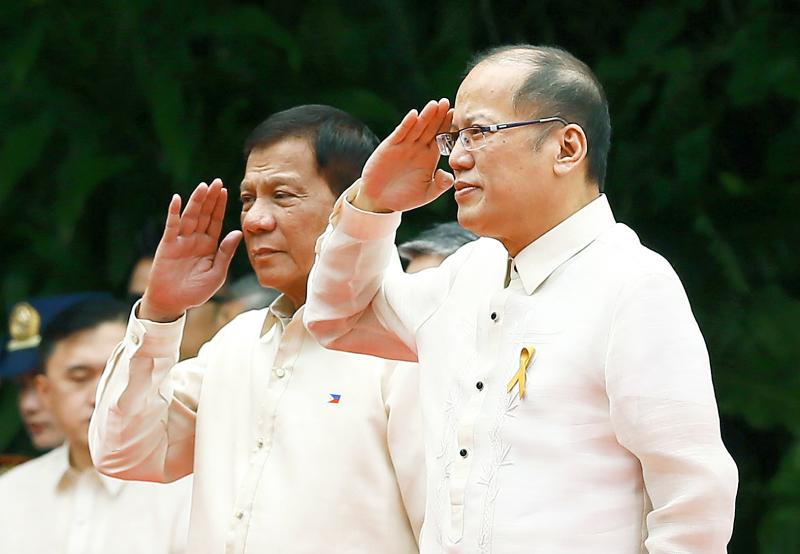Former Philippine president Benigno “Noynoy” Aquino III, the reserved scion of one of Asia’s most famous political families, died yesterday from kidney failure. He was 61.
Aquino, who was in office from 2010 to 2016, was the only son of former Philippine president Corazon Aquino and her assassinated husband, former Philippine senator Benigno “Ninoy” Aquino, both revered for leading the struggle to restore democracy in the nation.
Philippine President Rodrigo Duterte’s spokesman announced “Ninoy” Aquino’s death hours after local media reported that the former leader had been rushed to a Manila hospital.

Photo: AP
“We commiserate and condole with the family and loved ones of former president Benigno Simeon ‘Noynoy’ Aquino III,” presidential spokesman Harry Roque said. “We are grateful to the former president for his contributions.”
The unmarried politician “died peacefully in his sleep,” said Pinky Aquino-Abellada, one of Aquino’s four sisters.
“No words can express how broken our hearts are and how long it will take for us to accept the reality that he is gone,” said Aquino-Abellada, reading from a statement outside the mortuary.
“Noy, mission accomplished,” she added.
Philippine Secretary of Foreign Affairs Teodoro Locsin wrote on Twitter that “Ninoy” Aquino was “brave under armed attack, wounded in crossfire, indifferent to power and its trappings, and ruled our country with a puzzling coldness, but only because he hid his feelings so well it was thought he had none.”
“Ninoy” Aquino, who was succeeded by populist strongman Duterte, waged an anti-corruption campaign during a term that ushered in key economic reforms.
“Ninoy” Aquino was born on Feb. 8, 1960, to one of the country’s wealthiest land-owning political families.
A latecomer to the presidential race in 2010, he declared his candidacy only after his mother’s death from cancer the previous year had plunged the country into mourning and demonstrated the power of the family name.
He made fighting corruption his mantra, capitalizing on his family’s clean reputation, and vowed to reduce the poverty afflicting a third of the population.
His administration delivered average annual economic growth of about 6 percent, the highest since the 1970s, handing the country investment-grade status — but poverty remained endemic.
Unlike Duterte, “Ninoy” Aquino put the Philippines’ long-running dispute with China over competing claims to the South China Sea at the top of his foreign policy agenda.
He launched a landmark case with a UN-backed tribunal to challenge Beijing’s claims to most of the sea, which ruled in favor of the Philippines — even though Beijing rejected the decision.

Drug lord Jose Adolfo Macias Villamar, alias “Fito,” was Ecuador’s most-wanted fugitive before his arrest on Wednesday, more than a year after he escaped prison from where he commanded the country’s leading criminal gang. The former taxi driver turned crime boss became the prime target of law enforcement early last year after escaping from a prison in the southwestern port of Guayaquil. Ecuadoran President Daniel Noboa’s government released “wanted” posters with images of his face and offered US$1 million for information leading to his capture. In a country plagued by crime, members of Fito’s gang, Los Choneros, have responded with violence, using car

Canada and the EU on Monday signed a defense and security pact as the transatlantic partners seek to better confront Russia, with worries over Washington’s reliability under US President Donald Trump. The deal was announced after a summit in Brussels between Canadian Prime Minister Mark Carney and European Commission President Ursula von der Leyen and European Council President Antonio Costa. “While NATO remains the cornerstone of our collective defense, this partnership will allow us to strengthen our preparedness ... to invest more and to invest smarter,” Costa told a news conference. “It opens new opportunities for companies on both sides of the

The team behind the long-awaited Vera Rubin Observatory in Chile yesterday published their first images, revealing breathtaking views of star-forming regions as well as distant galaxies. More than two decades in the making, the giant US-funded telescope sits perched at the summit of Cerro Pachon in central Chile, where dark skies and dry air provide ideal conditions for observing the cosmos. One of the debut images is a composite of 678 exposures taken over just seven hours, capturing the Trifid Nebula and the Lagoon Nebula — both several thousand light-years from Earth — glowing in vivid pinks against orange-red backdrops. The new image

OVERHAUL: The move would likely mark the end to Voice of America, which was founded in 1942 to counter Nazi propaganda and operated in nearly 50 languages The parent agency of Voice of America (VOA) on Friday said it had issued termination notices to more than 639 more staff, completing an 85 percent decrease in personnel since March and effectively spelling the end of a broadcasting network founded to counter Nazi propaganda. US Agency for Global Media (USAGM) senior advisor Kari Lake said the staff reduction meant 1,400 positions had been eliminated as part of US President Donald Trump’s agenda to cut staffing at the agency to a statutory minimum. “Reduction in Force Termination Notices were sent to 639 employees at USAGM and Voice of America, part of a